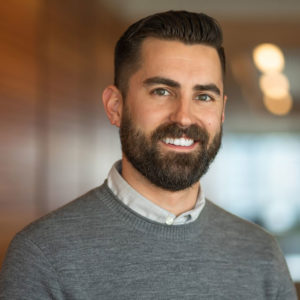AARON ROBERTSON
AARON ROBERTSON
Seattle Foundation
Managing Director, Policy & Civic Engagement
PLACES 2016 Cohort
PLACES Advisory Board
 Aaron Robertson grew up in High Point, Seattle, when the area was still a predominantly low-income community made up of public housing.
Aaron Robertson grew up in High Point, Seattle, when the area was still a predominantly low-income community made up of public housing.
As a white teen in High Point, he realized that while he and his non- white peers in the neighborhood shared similar economic conditions, they were treated differently when encountering authority figures.
“There was a fair amount of getting my skateboard confiscated by the police for skating in the supermarket parking lot,” said Robertson, who would wear a backpack with a picture of President George W. Bush and the words “not my president” affixed to it. His interactions with police always ended with a warning.
“I was pretty brash and outspoken,” he recalled. But his friends who weren’t white didn’t always share his penchant for pushing the boundaries.
“Being outspoken carried less risk for me,” said Robertson. “The level of punishment or engagement I had with authorities would look different than the experience of my peers who didn’t look like me.”
Robertson said those experiences helped lead him to a career that examines social justice and his role in addressing the systemic challenges that lead to a two-tiered system: one for white people and another for people of color.
Why did you get into philanthropy?
Philanthropy stuck out as a way to look at injustices that exist in society and address it on a systemic level.
What is the connected set of investments that address the root of the issues? I was definitely very naive to what that actually looks like. I thought, “They get to decide how resources are allocated.” There’s so much more complexity beyond that.
You were a PLACES fellow. What was that experience like and how has it impacted your work?
There was a moment that became infamous in our cohort. On our second trip to Connecticut, we were given a tour about the history of Hartford. Someone in our cohort raised a question about displacement and gentrification and the person giving us the tour was quick to deny race plays a role in what gets preserved. She said she doesn’t see color, she sees brick.
That moment galvanized many in our cohort.
There was a short pause of silence and then immediate push-back. It created a call-to-action, and I saw folks step up in that moment. There was a collective commitment to challenge assertions along those lines, and to support each other in doing that.
Focusing on equity and race is not something you get perfect, especially in institutions like philanthropy, and especially when you have white-identifying staff in those roles. I credit PLACES for making me a more effective advocate and helping me with how I show up in supporting others.
What is one of the biggest challenges you’re facing right now?
As an organization, Seattle Foundation has made a public commitment to address racial equity, but it has to be more than just stated. How do you put that into practice? It’s going to require long-term commitment — not only rethinking our investments, but being willing to walk into that knowing that structural and institutionalized racism is not something we’re going to realize change in anytime soon.
How do we bring this practice of patient urgency? We need to be urgent in how we address our resources because people are impacted now, but patient knowing large-scale change takes time.
We can’t abandon things because goals aren’t met in a year or two. That is a particular tension that exists.
If you could write a very short letter — “Dear People In Philanthropy…” What would it say?
Dear People in Philanthropy,
We have had a role in creating the systems that we are working against. That creates a responsibility to show up thoughtfully, engage the communities we serve and learn from them.
Our knowledge and biases need to be constantly questioned. We have had literally decades of repeating the same efforts without changing things on the ground. Shifting those outcomes will require fundamental change in how we approach this work.
Is there an internal question you’re constantly asking yourself while doing this work? What is it and how do you answer it?
For me as a cisgender, straight, white man trying to do work on racial equity, it’s constantly trying to identify my personal biases: “Why do I think that? And what would be different if my personal experiences looked differently?”
There is a fundamental assumption of who deserves to be decision-makers and inform processes. In being tasked with making judgements about what strategies are likely to be effective in furthering the goals of my programming, I need to distance what I believe would be effective because, “This is what works for me.”
I need to have trust in the perspective of others and figure out how to reset our decision-making process to be more inclusive of a lot more voices and not just my perspective. Slowing down to bring other voices in always strengthens results.
